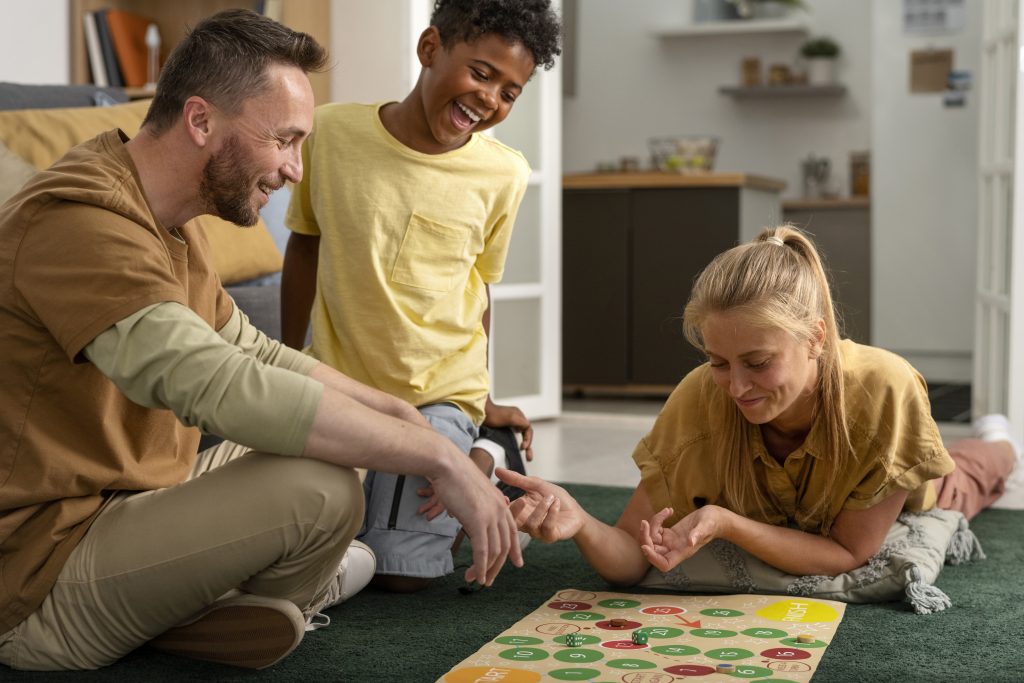You might be surprised to learn that board games offer more than just entertainment. From enhancing critical thinking and problem-solving skills to promoting social interactions and cooperation, board games have proven to be highly beneficial for children’s cognitive development. But that’s not all – these games also contribute to the improvement of memory, attention span, and focus. So, if you’re curious to delve into the educational value of board games and how they can positively impact your child’s growth and development, keep reading to uncover the fascinating benefits they have to offer.
Benefits of Board Games in Education
Board games offer numerous benefits for education, enhancing critical thinking, problem-solving, memory, cognitive skills, attention span, and social development. When it comes to education, board games provide an alternative learning method that promotes increased engagement and cognitive development. These games require critical thinking skills, as players must strategize and make informed decisions. By presenting challenges and obstacles, board games encourage problem-solving abilities and creative thinking. Moreover, the constant exercise of memory in remembering rules and opponent moves enhances cognitive skills such as logical reasoning, spatial awareness, and pattern recognition.
In addition to cognitive development, board games also foster social interaction. Players have the opportunity to interact with peers, siblings, or parents, learning important social skills such as taking turns, sharing resources, negotiating, and resolving conflicts. These social interactions contribute to the development of communication, cooperation, empathy, and sportsmanship. Board games also enhance language and communication skills, as players read instructions, discuss strategies, and explain rules.
Impact of the Pandemic on Social Skills
The COVID-19 pandemic has had a significant impact on children’s social skills, leading to limited interactions with peers and a deterioration in their ability to communicate and socialize effectively. Here are some key challenges that children have been facing:
- Deterioration in social skills: The lack of regular interaction with peers has resulted in a decline in children’s social skills. They may struggle with initiating conversations, maintaining eye contact, and understanding social cues.
- Limited interactions: With schools closed and social distancing measures in place, children have had limited opportunities to interact with their peers. This lack of socialization has made it difficult for them to develop and practice their social skills.
- Challenges in expressing emotions: The pandemic has brought about a range of emotions, such as fear, anxiety, and frustration. However, without regular social interactions, children may find it challenging to express and communicate their emotions effectively.
- Lack of cooperation opportunities: Cooperative activities and group projects are essential for developing teamwork and cooperation skills. Unfortunately, the pandemic has limited these opportunities, making it harder for children to learn how to work together effectively.
As a result of these challenges, many children have experienced feelings of boredom and loneliness. It is crucial for parents and educators to find alternative ways to support children’s social development during these unprecedented times.
Research on Board Games in Education
Due to the challenges faced by children during the pandemic in terms of limited social interactions and deteriorating social skills, it is important to explore the research on the effectiveness of board games in education. Effectiveness research has shown that board games have positive effects on cognitive development, classroom engagement, social interaction, and learning outcomes. Board games have been found to improve educational knowledge and cognitive functions, enhance interpersonal interactions and motivation, and promote learning and critical thinking skills. They also support curriculum objectives and student achievement. By incorporating board games into the classroom, teachers can provide a hands-on and interactive learning experience that fosters engagement and collaboration among students. Moreover, board games offer a unique opportunity for social interaction, allowing children to develop important social skills such as communication, cooperation, and empathy. The research suggests that regular play with board games can have a significant impact on children’s cognitive development and academic performance. Therefore, board games can be a valuable tool in education, providing both educational and social benefits to students.
Types of Board Games for Classroom Use
When selecting board games for classroom use, it is important to intentionally choose games that are new to students and have strategy and critical thinking aspects. Here are four types of board games that meet these criteria:
- Introducing new games: By introducing new games to students, you can spark their curiosity and engagement. It keeps the gameplay fresh and exciting, encouraging active participation and learning.
- Strategy games: Games that require strategic thinking help develop critical thinking skills in students. These games challenge them to analyze situations, make informed decisions, and adapt their strategies based on changing circumstances.
- Thinkfun games: Thinkfun is a renowned brand that specializes in educational board games. Their games, such as Circuit Maze and Rush Hour, are designed to enhance critical thinking and problem-solving skills while providing an enjoyable gaming experience.
- Breakout EDU Kits: Although not traditional board games, Breakout EDU Kits are interactive and immersive learning experiences. They involve solving puzzles and collaborating to “break out” of a locked box. These kits are highly praised for their ability to promote teamwork, critical thinking, and problem-solving skills.
Testimonials and feedback from teachers who have incorporated these types of board games in the classroom consistently highlight the positive impact on student engagement, critical thinking abilities, and overall enjoyment of the learning process.
Testimonials and Feedback on Board Games in the Classroom
Teachers who have incorporated board games in the classroom consistently report positive testimonials and feedback regarding the impact on student engagement, critical thinking abilities, and overall enjoyment of the learning process. The use of board games has been found to increase student engagement by providing a fun and interactive learning experience. Students actively participate in gameplay, which promotes active learning and critical thinking skills. According to teacher feedback, board games have led to improved learning outcomes, as students have shown a deeper understanding of the concepts being taught. Teachers have also expressed satisfaction with the social interaction that occurs during gameplay. Board games provide an opportunity for students to collaborate, communicate, and problem-solve together, fostering important social skills. Overall, teachers have found that incorporating board games in the classroom enhances student engagement, improves critical thinking abilities, and creates a positive and enjoyable learning environment.
| Positive Testimonials | Student Engagement | Learning Outcomes | Teacher Satisfaction | Social Interaction |
|---|---|---|---|---|
| Increased student participation and enthusiasm | Active learning experience | Deeper understanding of concepts | High satisfaction with board game implementation | Opportunities for collaboration and communication |
| Enhanced critical thinking skills | Fun and interactive learning | Improved problem-solving abilities | Positive impact on classroom dynamics | Fostered social skills |
| Promotes active learning | Increased motivation | Enhanced cognitive skills | Enjoyment of the learning process | Collaborative problem-solving |
| Creates a positive and enjoyable learning environment | Improved academic performance | Development of strategic thinking | Supportive classroom atmosphere | Communication and teamwork |
| Engages students in the learning process | Encourages critical thinking | Application of knowledge and skills | Increased student involvement | Cooperative gameplay |
Educational Board Games for Back to School
Back to school season calls for the incorporation of educational board games to engage students and enhance their learning experience. Here are four reasons why these games are beneficial for young minds:
- Learning through play: Educational board games provide a fun and interactive way for students to learn and retain information. By incorporating educational concepts into gameplay, students can acquire knowledge and skills in a more enjoyable manner.
- Engaging young minds: Board games capture students’ attention and keep them actively involved in the learning process. They provide a break from traditional classroom activities and offer a hands-on approach that stimulates curiosity and interest.
- Encouraging critical thinking: Board games require strategic decision-making, problem-solving, and logical reasoning. They challenge students to think critically, analyze situations, and make informed choices, fostering valuable cognitive skills.
- Promoting social and emotional development: Board games encourage social interaction, cooperation, and communication among players. They provide opportunities for students to develop empathy, sportsmanship, and conflict resolution skills, fostering emotional intelligence and positive relationships.
Educational Board Games Featuring Notable Women in History
As we continue exploring the benefits of educational board games, let’s now focus on a captivating subtopic: board games that feature notable women in history. These games provide an opportunity to learn about the achievements and contributions of remarkable women while having fun and engaging in strategic gameplay. By representing women in educational games, we can empower girls and promote gender equality.
Here are some examples of educational board games featuring notable women in history:
| Game | Notable Women in History |
|---|---|
| Herstory | Ruth Bader Ginsburg, Joan of Arc, Marie Curie, Amelia Earhart, Malala Yousafzai |
Herstory, for instance, showcases the stories of Ruth Bader Ginsburg, Joan of Arc, Marie Curie, Amelia Earhart, and Malala Yousafzai. Through playing these games, children and adults alike can learn about the struggles, accomplishments, and impact of these influential figures. By including historical women as game characters, we can encourage a more inclusive and diverse understanding of history.
Educational board games featuring notable women in history not only promote learning but also serve as a source of inspiration for young girls. By highlighting the achievements of these women, we can empower girls to believe in their own potential and pursue their dreams.
Benefits of Board Games for Family Bonding
Playing board games with your family provides numerous benefits for fostering strong bonds and creating lasting memories. Here are some of the benefits of board games for family bonding:
- Enhanced communication skills: Board games require players to communicate with each other, whether it’s discussing strategies, explaining rules, or simply having fun conversations during gameplay. Regularly engaging in these conversations can improve communication skills for everyone involved.
- Strengthened relationships: Board games provide an opportunity for family members to spend quality time together, engaging in a shared activity that promotes cooperation, teamwork, and friendly competition. These positive interactions can strengthen relationships and create a sense of unity within the family.
- Improved problem-solving abilities: Board games often present challenges that require players to think critically, make strategic decisions, and adapt to changing circumstances. By engaging in these problem-solving activities, family members can develop their problem-solving abilities and learn to think creatively.
- Increased quality time together: In today’s fast-paced world, finding quality time to spend with family can be challenging. Board games offer a structured and enjoyable way to spend time together, away from screens and other distractions.
- Fun and enjoyable shared experiences: Board games provide an opportunity for laughter, excitement, and shared experiences. They create memories that can be cherished for years to come, fostering a sense of togetherness and creating a positive family culture.














